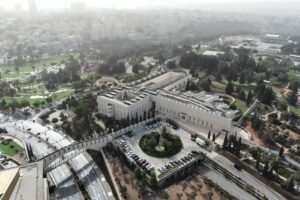Israel’s Supreme Court Mandates Military Draft for Ultra-Orthodox: A Game-Changing Decision

Introduction
In a landmark decision, Israel’s Supreme Court has unanimously ruled that ultra-Orthodox men must begin serving in the military, marking the end of decades-long exemptions. This ruling could potentially destabilize Prime Minister Benjamin Netanyahu’s coalition government amidst ongoing conflict in Gaza. This article explores the implications of this historic ruling, its impact on Israeli society, and the potential political fallout.
For more insights and updates, visit Americana Pulse.
The Court’s Decision
Ending Decades of Exemptions
On Tuesday, Israel’s Supreme Court struck down the long-standing system that allowed ultra-Orthodox men to be exempt from compulsory military service. This unanimous decision declares that all citizens, regardless of religious affiliation, must serve in the military, thereby ending a practice deemed discriminatory by many.
Legal and Social Ramifications
The ruling effectively nullifies a 2017 law that codified these exemptions, a law that had been extended multiple times due to governmental delays. The Supreme Court emphasized that in the absence of a new law, the standard compulsory military service applies to ultra-Orthodox men just as it does to other Israeli citizens.
Historical Context
The Exemption System
Under the previous arrangement, ultra-Orthodox men were exempt from the draft, which is mandatory for most Jewish men and women in Israel. This exemption allowed them to focus on full-time religious studies, a practice seen as their contribution to the state. However, this created significant tension between the secular and religious communities.
Public and Political Response
The secular public has long been frustrated by these exemptions, especially during the ongoing war in Gaza, where the military has called up tens of thousands of soldiers. The Hamas attack on October 7 has resulted in over 600 soldier fatalities, intensifying the need for additional military personnel.
Political Implications
Coalition Stability
Ultra-Orthodox parties, key partners in Netanyahu’s coalition, strongly oppose the ruling. The end of exemptions could prompt these parties to leave the coalition, potentially causing the government to collapse and triggering new elections at a time when Netanyahu’s popularity is waning.
Netanyahu’s Dilemma
Netanyahu faces a significant challenge in balancing the court’s ruling with the demands of his ultra-Orthodox coalition partners. His party, Likud, has criticized the ruling and suggested that a parliamentary bill could address the issue. However, critics argue that such measures fall short of meeting Israel’s wartime needs.
Military and Social Impact
Immediate Effects on the Military
The military is expected to begin drafting ultra-Orthodox men once a plan is in place. The army, which has not yet commented, will need to accommodate the unique lifestyle of the ultra-Orthodox community, which is deeply opposed to military service and follows a cloistered way of life.
Social Repercussions
The ruling is likely to exacerbate tensions within Israeli society, particularly between the secular and religious communities. Previous attempts to enforce military service for the ultra-Orthodox have led to protests and violence.
Demographic Considerations
Growing Ultra-Orthodox Population
The ultra-Orthodox community, which makes up roughly 13% of Israel’s 9.9 million population, has a high birthrate and is the fastest-growing segment of the population. Each year, about 13,000 ultra-Orthodox males reach the conscription age of 18, but less than 10% enlist.
Educational and Social Integration
Ultra-Orthodox men typically attend seminaries that focus on religious studies with little emphasis on secular subjects. Critics argue that this leaves them ill-prepared for military service and integration into the secular workforce.
Future Prospects
Legislative Challenges
The government could attempt to pass a new law to restore exemptions, but this would be politically difficult given the Supreme Court’s ruling. Some moderate government members advocate for enlisting large numbers of ultra-Orthodox, making consensus difficult to reach.
Potential for New Elections
If the ultra-Orthodox parties withdraw from the coalition, it could lead to new elections. This comes at a time when Netanyahu’s government is under intense scrutiny and his popularity is in decline.
Conclusion
The Supreme Court’s ruling mandating military service for ultra-Orthodox men marks a significant shift in Israeli society and politics. It addresses long-standing issues of inequality and social division but also poses serious challenges for the current government. As Israel navigates this new landscape, the ruling’s full impact remains to be seen.
For ongoing coverage and detailed analysis, visit Americana Pulse.
Israeli Supreme Court, Ultra-Orthodox, Military Service, Benjamin Netanyahu, Israeli Politics, Gaza Conflict, Draft Exemptions, Secular vs. Religious Divide, Israeli Society, Military Draft
